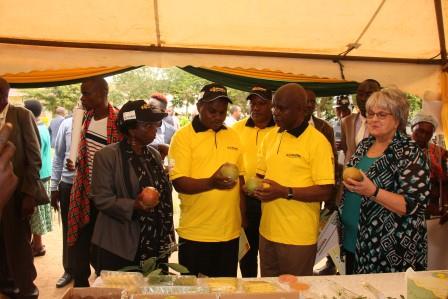The national government in collaboration with key agencies and development partners launched a pest free zone campaign to eradicate fruit flies in mango production.
The campaign dubbed Komesha Fruit Fly aims at curbing the fruit fly menace and help mango farmers access the lucrative European and US markets.
Director for Research and Innovation at the Ministry of Agriculture Dr. Oscar Magenya speaking Wednesday on behalf of the Agriculture Cabinet Secretary Peter Munya during the launch of the campaign at Kwa Kathoka ATC grounds said the initiative will improve the livelihoods of farmers through quality mango products that conform to the standards of the export market.
Through the campaign, mango farmers will be trained on modern pest management technologies to address the fruit fly on mango fruits. They will also receive funding and equipment to eliminate the fly.
Dr. Magenya said the campaign will target 7,500 households in Makeni covering 3,000 hectares in the first phase.
He said establishment of pest free zones offer long term solutions on pest control and management and urged relevant stakeholders to collaborate to ensure sustainability of the initiative.
“All relevant stakeholders including the National Government, the County government, development partners and the communities should do what is necessary to maintain and sustain the pest free areas for not only mangos but also other fruits and crops,” said the director.
Magenya also called on other counties especially the neighbouring devolved units to replicate the same. “This should be extended to the neighbouring counties like Kajiado and eventually rolled out across all the other counties in the country,” he added.
He said the government was applying a raft of other measures to mitigate the fruit fly for increased quality mango production.
Magenya said the measures include certification of mango farms and produce, capacity building of stakeholders in the mango value chain, development of modern mango collection centres in every ward, establishment of at least one modern open air market facility for mango and other fresh produce.
Others are establishment of a pack house fitted with hot water treatment and compliance on mango certification to ensure that the standards conform to the European market.
However, he noted that despite the strides made, the sector was still facing numerous challenges which included high incidences of mango seed weevil, rust, powdery mildew, thrips, and spider mites and other pests as well as diseases during the pre and post production stages that are exacerbated by high cost of pesticides.
The director also added that poor agronomical practices, inadequate infrastructure and lack of market information by farmers were also a problem. “There are also cartels and dishonest practices that lock out farmers from accessing the local market,” said the director.
Speaking at the same event, Makueni Governor Prof. Kivutha Kibwana called for concerted efforts towards the elimination of the fruit fly.
Kivutha said mango was the second most common fruit after bananas in the country producing close to 789,000 metric tonnes valued at Sh11.9 billion.
He said Makueni leads in mango production in Kenya with over 4.3 million trees valued at Sh4.7 billion.
However, the governor noted that despite mango farming being the mainstay of 70 percent of rural households in Makueni, the county experiences losses between Sh2 to Sh3 billion due to fruit fly infestation and other post-harvest damages.
“Only 2 percent of this production is exported while another 60 percent goes to less lucrative local markets outside the county. The rest of production, about 30-40 percent was going to waste before we set up the fruit processing plant in Kalamba,” said Kivutha.

USAID Kenya Representative Harrigan Mukhongo said the fruit fly infestation in mango production is a major barrier for export market in Makueni and Kenya at large.
Mukhongo said USAID will grant Sh64 million to help eradicate fruit fly in Makueni and Kitui counties.
He reiterated USAID’s commitment in helping mango farmers produce high quality produce that will improve their livelihoods and spur economic growth.
“There are appropriate affordable and environment friendly technologies to eradicate fruit fly and we will continue to support farmers to be self-reliant by producing quality mango fruits,” said the USAID representative.
Dr. Isaac Macharia, General Manager Phytosanitary Services at the Kenya Plant Health Inspectorate Service (KEPHIS) said there was need for Kenya to recapture the European mango market through production of high grade mango fruits that meet the international standards.
Macharia said the creation of pest free zones will help reduce the fruit fly population.
“The fruit fly leads to losses of 40 percent and if eradicated farmers will get access to export market,” he said.
The general manager noted that Kenya’s ban on mango export in 2014 was due to fruit fly noting that pest free zones will lead to quality products.
The Komesha Fruit Fly campaign will last for two years and is expected to increase the export market share by addressing the market compliance.
It is being implemented by a Mango Technical Work Group which includes national government departments, Makueni County Government, Feed the Future Kenya Crops and Dairy Market Systems, KEPHIS, Rockerfeller Foundation, Technoserve, UNIDO, mango traders and development partners.
By Roselyne Kavoo





